Our beloved Colombia is going through a very, very complicated moment. It is true, our country is no stranger to social problems, irregularities, corruption, narcos, cartels, corrupt politicians, poverty, but this current situation is taking us to the extreme.
We are talking about the demonstrations, the strike, the riots, and the wave of violence that has been generated in the country as a result of the Tax Reform.
We are well aware that this is not an easy issue, it is very complicated and there are many actors involved.
A new chapter of violence
This new chapter of violence and riots began after President Ivan Duque, on April 15, filed the tax reform that sought to overcome the deep economic crisis caused by the pandemic. The goal was to raise 23.4 trillion pesos (there are so many zeros that I can’t even fit in my head).
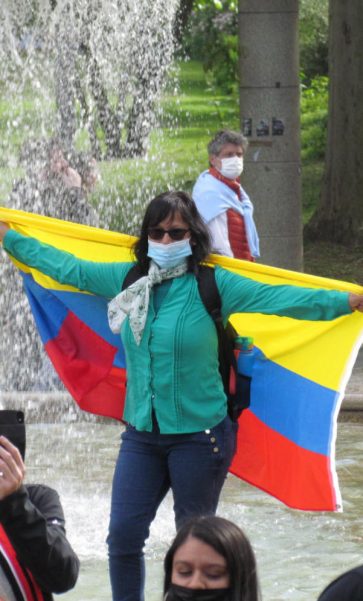
The Colombian president reiterated that the reform was necessary to stabilize the accounts, reassure the international markets and expand aid to the vulnerable population.
But what nobody imagined was that the Tax Reform project would become the trigger for the situations that occurred later. Of all these situations, the most complex has been the days of chaos, protests, indignation, deaths, destruction of private property, fear, and danger in the streets of the cities of our country.
After several days of protests and demonstrations throughout the country, the president, Iván Duque, asked Congress to withdraw the controversial tax reform bill presented by his government and which had unleashed strong protests.
The demonstrations began peacefully, with marches, flags, music, drumming, and dancing … but as the hours went by, violence intruded into the demonstrations.
But it is really necessary to emphasize that the violence has also been on some occasions on the part of the police, of the security forces. It is not possible to say that anyone can be saved from saying that they did not commit acts of violence. It did not take long before there were outbreaks of violence and confrontations between demonstrators and the police, which led to complaints of police abuse.
This began with the tax reform
It was important for us to ask people for their opinions on the current situation. Here are some of the responses.
Laura Viera: How are you affected by the tax reform?
Gina R: The tax reform would affect us in many ways…the tax reform, the health reform, the pension reform, this reform would tighten the noose around our necks in a thousand ways.
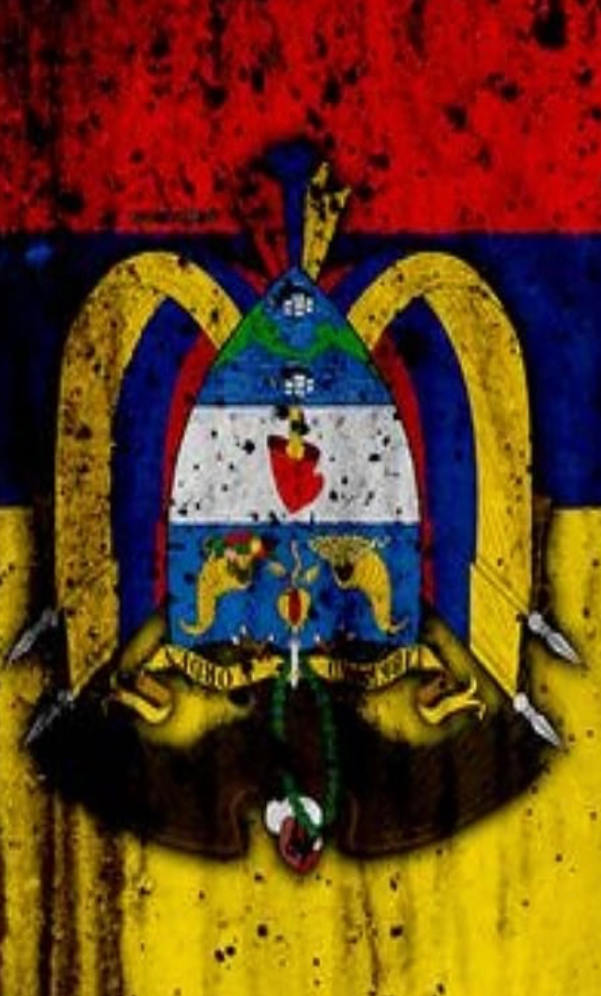
Lina H: I don’t earn much but I am at the top of the income limit to declare income according to the reform and the truth is that the middle class hardly pays their expenses so in that case, it affects me a lot.
Ana Cristina: It affects me in the sense that the prices of everything went up, of food. now what we would earn would not be enough to buy the basic basket of goods. it also affects what corresponds to tolls… you get around in that vehicle. in the income tax return, it affects you in the sense that my husband works with a minimum wage plus overtime, and after the income tax is declared for those who earn more than 1 million pesos so, in that sense it does not affect you much and in other aspects as well.
Laura Viera: What do you think about the strike?
Carlos: The strike is necessary because the people are tired of not getting what they promise, and with this reform, or those reforms, they were affecting everybody.
Pepe: I believe that Colombia is a country of postponed crises and of problems that have been left behind… and I believe that the strike simply shows that because it started with tax reform but other problems have been surfacing that are already more structural in Colombia, among them inequality, poverty, unemployment, which have also been worsened by covid.
Demonstrations are perfectly understandable. It is the way people have to demonstrate their disagreement with the government. What I do not agree with is that they use demonstrations as an excuse to destroy and vandalize people’s businesses. There is no excuse, nobody has to live with that fear.
Pedro: I believe that the strike is a way for the common citizen to show his discontent towards one measure or another implemented by the government or the Colombian State. at the moment, Colombia is living in one of the most precarious economic situations, so to speak, and that they touch your pocket knowing that you have no money, is one of the biggest disconformities and that is why I think it would be good to mobilize in some way.
Laura Viera: What do you think is unfair?
Gina R: The cost of living is going to go up. adding to that all that… it is not fair. in the health sector, even more… to give that money to one person, it is not fair, it is humiliating, the cost of living, the cost of being able to do business.
Lina H: Well, what you really want is to pay your expenses, and apart from having to declare income without earning much, I do not see it as viable.
The Sustainable Solidarity Law
Iván Duque insists on calling this reform: the Sustainable Solidarity Law. But, it is based on a traditional line of Colombian economic policy which is basically to prioritize prudence to give confidence to the markets and maintain certain stability.
What happens is that people do not consider that this is not a solidarity law. they consider that it is a law that wants to make up a reform that will always favor the people who have the most money.
Our politicians are greedy and being greedy does not allow them to think about how we should evolve. If we want change we have to get rid of the same people who have always governed us. Besides that, we have to get the senate and the congress to be reduced. The minister and the president can change but as long as the same congressmen and senators continue nothing will change.
No matter how much effort Duque makes to emphasize the welfare value of his reform, his economic initiatives have a perhaps irremediable problem: the Colombian people totally distrust them.
Mr. Duque wanted this to be one of his flagship projects and intended to plug the hole in the government’s coffers. Obviously, the Colombian government, like many others, has had to work near miracles since the pandemic began.
But, this project affected the middle class and people with less economic income. Who, in a way, are the ones who have been most affected by the health crisis as thousands of Colombians are out of work.
Laura Viera: We need the tax reform?
Gina R: Yes it is necessary because we have to pay the debt already acquired and the foreign debt but for me, it is more conscious that the government says, the congressmen, the senators, the president himself, say, let’s reduce our income, our vans .. because it has to hurt the citizen, they are selfish and are greedy. being greedy does not let them think, and if we want the country to really change first we have to get out the same people who have always governed us and achieve that…… the same congressmen and senators nothing is going to change.
As this is such a broad issue that goes much further than tax reform, there are also problems due to the wave of violence. and we want to know, what are the social demands?
Ricardo: People are asking for more equality so that the rights of all people are protected.
Carlos: Several things, as it is a general discontent. the first thing they are asking for is not to carry out a tax reform that
the middle class and the poorest people of Colombia. …that the peace agreements are respected…that no more social leaders are assassinated, that the State investigates judicially those responsible…and finally we say no to fracking.
One issue that cannot be overlooked is that there is a wave of violence hitting the citizens. The acts of violence are not only by civilians but also by the government.

Lina H: There are videos that show how ESMAD members are destroying things to blame the demonstrators. So, I think that in some way the government could be involved as it was last time, on 21N.
Social problems, people’s fear, and going out took the citizens. It seems that people forgot that the protests and demonstrations were to oppose a tax reform… instead what began to happen is that the cities began to be destroyed, streets were blocked, establishments were burned, tolls began to be charged to move from one part of the city to another. Obviously, the supermarkets began to experience a lower quantity of products to offer.
Ines Elvira: I have been very afraid and I have not gone out of my house at all.
Gina R: Yes I am afraid
Human Rights
Let’s talk a little bit about human rights. Because it is said that people who are protesting have rights, and obviously you have them. Every citizen has the right to show his discomfort or disagreement with the government. what we don’t have the right to do is to damage cities, to damage private businesses, to demand respect when we don’t give it.
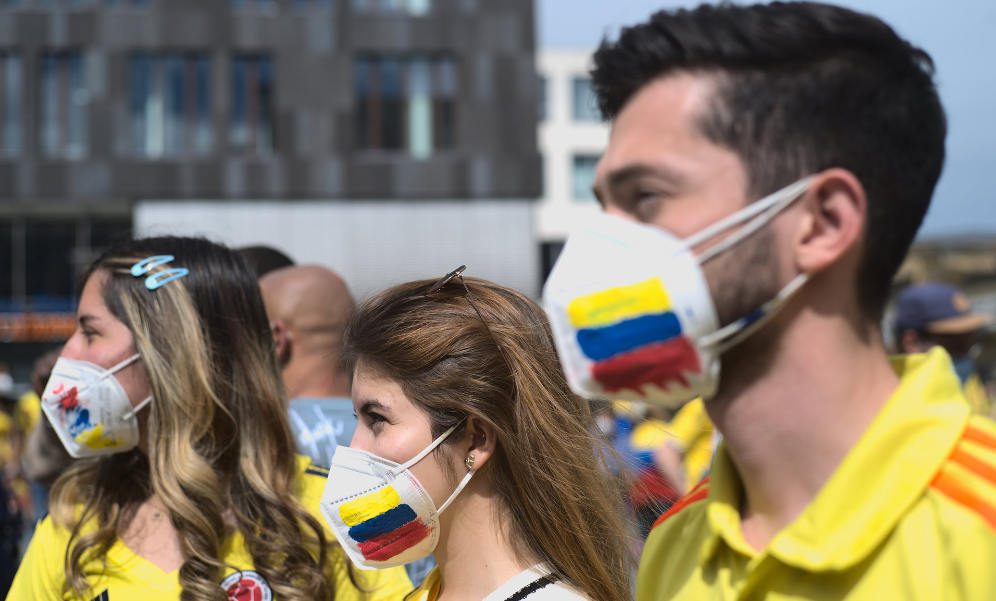
Ines Elvira: then whose human rights are those of the vandals, of the protesters, of the civilian population, of the police, of the armed forces? who has the right to human rights… because here as we see things, human rights are for…better said if they cultivate them but in coca, besides all the subsidies that they give them for education, etc.. …so I ask myself for who are human rights, and what are we talking about when we talk about human rights, do we the civilian population have rights to human rights? well it doesn’t show, they are treating us as if we were caged dogs…a wild rat…so, what human rights are we talking about?
Gina: Human rights are not being respected. We cannot march peacefully. There have already been too many deaths. there is an enormous arbitrariness….. tear gas and beating people.
Laura: Because of all these demonstrations and social mobilizations, there has also been a response from this government…it represents a political party, it is the democratic center…we have a very complex situation and there is an excess of public force…video where you can see how the police are attacking the civilian population…this is very serious, this is very serious in terms of human rights.
Yolima: Clearly human rights are not being respected or at least what is clear internationally in the different human rights treaties…nor neutralized by the State forces, the police, the prosecutor’s office, nobody investigates them…if they have been documented by the different human rights organizations…violation of the international human rights treaties.
Laura Viera: I wonder what is happening right now, why have we reached this situation?
Carlos: What is happening to the people, because they are waking up … unhappy with this government, …. to protect the rights of all people.
Laura: Before the pandemic, Colombia had been presenting a series of disagreements with the Duque government that also come from before. we cannot say that it generates nonconformity. I believe that this is the government that at this moment is showing its face. but finally, as Colombians, we have been lagging behind in social investment, education, human development opportunities, decent work, and others for a long time, so I believe that here a sleeping lion is waking up, and finally, we are tired of corruption, inequality, and the huge social gaps we have.
International demonstrations
All around the world people mobilized to demonstrate against the situation that is being experienced in the country.
In the case of BBC World of London, this important media headlined: ‘Protests in Colombia: how violence took the streets of the country (and why Cali was the epicenter for days)’.
They state that violence by the public forces against demonstrators in Cali’s Comuna 20 interrupted a peaceful day of ‘velatón’ in honor of the people who have died in the clashes of the last few days.
The newspaper also reported that “the government of Iván Duque, who proposed this Tuesday a negotiation table with all sectors including demonstrators, attributes the violence to infiltrators of guerrilla and terrorist groups, as well as to vandals who take advantage of the situation to loot commerce”.
In Berlin, Hamburg, Frankfurt, Stuttgart, Munich, and Bonn, groups of Colombian expatriates organized demonstrations in solidarity with the victims of the recent days of protest in the country. Since April 28, hundreds of people have taken to the streets to demonstrate their rejection of the possible implementation of a tax reform bill and the health care system in Colombia.
Laura Viera: Did you participate in the marches?
Yolima: I participated in 2 of the 3 mobilizations and sit-ins that took place in Frankfurt am Main. Not only did I participate but I was part of the committee that organized them. They were very organized mobilizations and the police accompanied us to give security to the mobilization, as it usually happens with all demonstrations here in Germany. The demonstrations took place on the basis of a program that we had made, which mainly promotes dialogue to solve the problems in Colombia and informs people about the current situation with concrete data. The demonstrations were full of conscience, content, and a very strong feeling and very great sadness for the terrible situation that is being experienced in Colombia. This was a massive mobilization.

Laura Viera: Why is it important to mobilize people outside the country?
Yolima: It is important because the message for the international community should be that we Colombians abroad, in different parts of the world, are being the real diplomatic mission to give a voice to those people who are protesting in Colombia. As we have seen the government of President Dique, refuses to dialogue, does not recognize it, does not want human rights rapporteurs, so there is a total hermeticism. So, we have been the bridge to make known abroad these excesses, these human rights violations, the irregularities, the excessive force, the crimes, and how they are working with paramilitary groups.
International marches in support of the Colombian situation around the world were events that began to develop one after another. Both Colombians and foreigners marched and called for change.
On May 6th there was a ‘velatón’ of Colombians in Panama. On the ninth day of mobilizations, there was a demonstration in Time Square in New York. In Tallin, Estonia, there was a meeting of Colombians, who denounced the excessive police force and vandalism in the midst of the protests. There was a sit-in in front of the Colombian embassy in Mexico.
The acts of violence that have marked the protests in Colombia have left too many dead and wounded. In addition, there are hundreds of images, videos, and audios where the degree of violence to which the protests have escalated are circulating on social networks.
The group of people who are mobilizing internationally wants to make visible the political reality and social problems in Colombia.
About the IACHR
Although the protests have developed peacefully, for the most part, several organizations have denounced violent acts by vandals and members of the security forces, while several blockades continue to impede the passage of national roads.
In view of the demonstrations and the wave of violence that has hit the country, the Inter-American Commission on Human Rights has asked to visit the country.
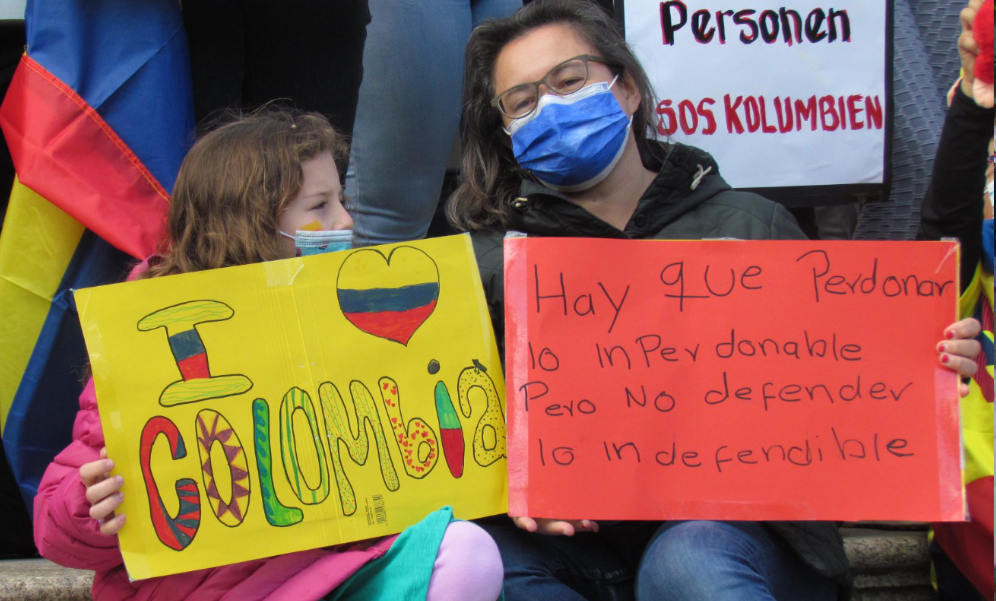
The idea of this visit would be to verify on the ground the allegations of human rights violations that have been reported in the midst of the national strike.
However, Vice President Marta Lucia Ramirez, who also serves as foreign minister, indicated that for now, she did not consent to the visit of the IACHR and that it was necessary to wait for the internal investigations of the events to be completed.
In other words, the Colombian institutions must first be allowed to work so that the international bodies can come to the country to evaluate the situation after several weeks of protests.
Laura Viera: What do you think about the fact that at this moment, the IACHR is not being received in Colombia?
Yolima: It is a very serious message that the government of President Duque is sending by not allowing the entry of human rights verifiers. A group of verifiers who were traveling from Argentina were deported, taken to a holding room, intimidated, and beaten in the face. The situation is really very serious, it seems to me that the message sent by the government is a threat to the people who were trying to verify the government’s compliance with human rights.

Obviously, this decision has been criticized and questioned by experts in human rights and international law.
It should be noted that on May 14, the IACHR made a request to the Colombian government to verify the human rights situation in the context of the violent events that have occurred since April 28th.
Laura Viera: And what do you think about the reasons for not allowing entry?
Yolima: The excuses they gave for not allowing entry are not valid. They say that first, they want the country’s own investigations to be carried out, but one thing does not exclude the other. In fact, the entry of the commission could help to guarantee the transparency of state institutions such as the prosecutor’s office, the attorney general’s office, and the ombudsman’s office in which people do not trust.
Some of the consequences
One of the many consequences has been experienced in the medical sector. I am not talking about regulations, or authorizations for surgeries, or inadequate service. I am talking about the way in which the blockades have caused damage to patients and the supplies needed for their care.
A baby died in Buenaventura after the ambulance that was transporting her was trapped in a confrontation between the public forces and protesters who were blocking the road. This is one of the situations that has no presentation.
Under no circumstances can it be considered part of a peaceful protest the fact that there are blockades that prevent medical missions, food, and medicine.
On the other hand, Fama referred to the case of a baby who died in the first week of the strike, in Cundinamarca, after being born prematurely and being trapped in a blockade of the ambulance by protesters.
There is no right either, that someone should be so cruel and perverse as to say that the child was going to die anyway, so it is not so dramatic. These words were expressed by María Antonia Pardo, Gustavo Petro’s communications chief, on Twitter.
Whatever happens, medical missions, doctors and health personnel must be respected, since all people have a fundamental right to health against which no one can attack.
Some possible scenarios
In one way or another, all Colombians hope that after these demonstrations and national strikes, positive changes will be achieved. We hope that the situation will change. With this in mind, we must imagine some possible scenarios in this chapter of our history.
** Scenario 1: nothing changes **
That is, it could be that after all these protests, all these struggles, and confrontations, everything remains more or less the same with a slow trend towards the de-escalation of violence.
The strike committee is calling for several reforms that are ambitious and costly. These reforms imply changes in the structure of the state and in the government plan.

But there are some temporary solutions. For example: lowering the cost of tolls and regularizing hiring rates for truck drivers; creating incentives for private university entrance; launching subsidies for micro-enterprises and peasants; promoting transparency mechanisms to investigate police abuses.
Regarding the tax reform, which gave rise to this national strike, it is possible that an unambitious law will be approved and thus the fiscal problem can be solved.
With announcements along these lines, the problems that inspire the social protest will not be attacked, at least not with ambition: economic and social inequality, the militarization of the police, and the lack of results of the peace agreement with the guerrillas.
** Scenario 2: the essentials are negotiated.**
Another scenario is to negotiate only the essentials in order to get out of this problem that afflicts us. This would require those different sectors to reach a consensus on the fundamental issues, generate confidence among the population and violence becomes a matter of the past.
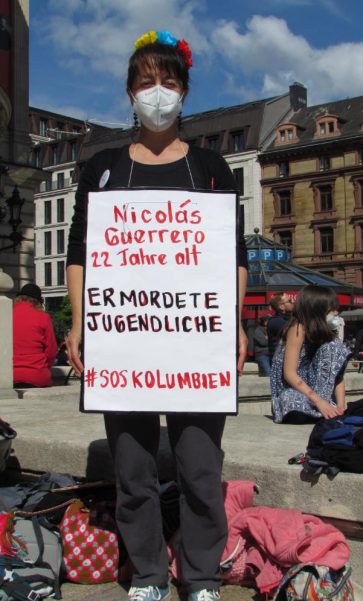
The State will have to do several things such as to ask for forgiveness and offer better education, job offers, and health programs.
** Scenario 3: more violence **
A second scenario would be that the violence in the country continues and possibly increases, that is, that the country enters a spiral of violence in which the abuse of authority of the public forces joins with small civilian armies that fight for their interests in the face of an absent state.
In some areas of Cali, resistance has already become a way of life: they organize supplies, have links with gangs, are supported by the local population, and decide who does or does not pass through which street.
To avoid this terrible scenario we would need to have both creative politicians and politicians in whom people really believe.
Concluding for the moment
We know that much remains to be said, much remains to be done in this story. This is just one more chapter in the history of our country.
But the questions remain, at least I feel that there are more questions than answers in this environment, at this moment.
Why so much rage, where did this amount of hate come from, why can’t we sit down and talk about the change we need as a country and as a society, for how long has it seemed normal for people to die?
We must remember that violent people are everywhere: many times they are civilians, politicians, policemen, armies, members of armed groups. Violent are those who prefer weapons before dialogue, violent are those who attack civilians, violent are those who burn police officers, violent are those who use weapons against those who exercise their right to peaceful march, violent are those who disappear, people, violent are those who damage transportation systems and businesses, among others.
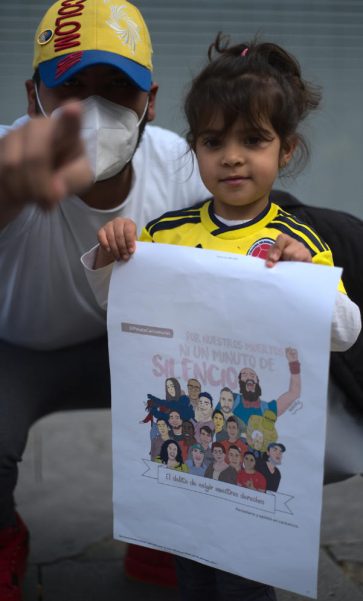
We have to ask ourselves if we want and deserve to destroy, kick, burn, kill, attack, beat in order to achieve change. With this level of rage, pain, and hatred, dialogue is not possible and there will never be any possibility of finding solutions.
In my humble opinion, and this is my personal opinion and no one else’s, we are living in a culture of hate and I think this is one of the biggest problems. We hate each other. I am well aware that there is unemployment, there are no equal job or educational opportunities, that there are state failures, that there are no politicians who really inspire us and who give their all for the people, that the health system is a joke, but suddenly, if we are able to really listen and stop the aggressions we can achieve the necessary changes in our country.
Now, we just have to wait to see how we solve our present, how we help, how we get out of this social and economic problem that afflicts us. We have to achieve some kind of change, we have a very deep wound and if we do not heal it at any moment it will generate pain again. SOS Colombia, SOS Colombia!


